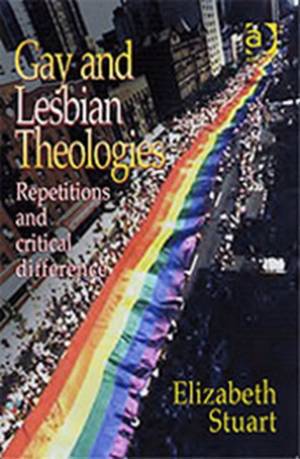
En raison d'une grêve chez bpost, votre commande pourrait être retardée. Vous avez besoin d’un livre rapidement ? Nos magasins vous accueillent à bras ouverts !
- Retrait gratuit dans votre magasin Club
- 7.000.000 titres dans notre catalogue
- Payer en toute sécurité
- Toujours un magasin près de chez vous
En raison de la grêve chez bpost, votre commande pourrait être retardée. Vous avez besoin d’un livre rapidement ? Nos magasins vous accueillent à bras ouverts !
- Retrait gratuit dans votre magasin Club
- 7.000.0000 titres dans notre catalogue
- Payer en toute sécurité
- Toujours un magasin près de chez vous
Gay and Lesbian Theologies
Repetitions with Critical Difference
Elizabeth Stuart
Livre broché | Anglais
97,95 €
+ 195 points
Format
Description
Gay and lesbian theology has been one of the most distinctive voices to have emerged in Christian theology in the last 30 years. It has placed lesbian and gay experience at the heart of the theological process. Elizabeth Stuart, one of the most prominent theologians in this field, presents the first critical survey of gay and lesbian theology arguing that its emergence was nothing short of miraculous. Gay and lesbian theologians managed to take a dominant Christian discourse which rendered them sinful, sick and harmful to the common good and transform it into a theology which argued that a person's sexuality provided the point of contact between God and themselves. Stuart argues that, miraculous though this was, gay and lesbian theology has revealed itself to be 'bankrupt' - incapable of providing universally convincing reasons for the inclusion of lesbian and gay people and their relationships in the Church and unable to deal with the defining experience of lesbian and gay communities in the late twentieth-century - AIDS. Stuart concludes that lesbian and gay people and their opponents in the Church have too easily bought into modern constructions of sexual identity and cut themselves off from a Christian tradition which is far more 'queer' in that it refuses to accept the stability of gender and sexual desire. Stuart argues that the only way out of the current deadlock on the issue of homosexuality in the Churches is for both sides to embrace this ancient queer tradition - a Christian tradition which teaches that in the end gender and sexual identities have no ultimate importance.
Spécifications
Parties prenantes
- Auteur(s) :
- Editeur:
Contenu
- Nombre de pages :
- 132
- Langue:
- Anglais
Caractéristiques
- EAN:
- 9780754616610
- Date de parution :
- 20-05-03
- Format:
- Livre broché
- Format numérique:
- Trade paperback (VS)
- Dimensions :
- 155 mm x 231 mm
- Poids :
- 272 g

Les avis
Nous publions uniquement les avis qui respectent les conditions requises. Consultez nos conditions pour les avis.






